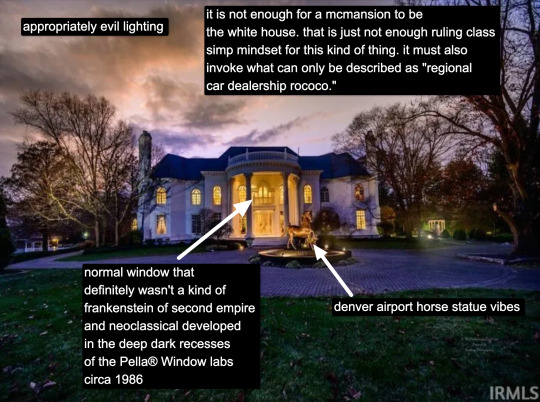I am a professional internet enthusiast. I made Everybody at Once with Slavin and Molly. I also made Know Your Meme with Jamie, Ellie, and Drew. Before that I did a bunch of things in online video and art and activism and internet culture.
Don't wanna be here? Send us removal request.
Text

The wood frame used to proof each of the hand-made body panels for the original, hand-built run of the Porsche 356
Via https://carbuzz.com/news/not-a-single-porsche-356-would-exist-without-this-old-piece-of-wood/
48 notes
·
View notes
Text
reblogging for this gem:
Pro tip: there’s a way of saying “wow it’s so big�� that can land as the most devastating insult in the rhetorical lexicon.
simulacra for bootlickers
FYI, this post is a little more NSFW than usual with the language.
Usually I think McMansions are kind of funny. Sometimes, I even like them. If I didn't like them at least a little bit, I don't think I'd be running this blog for a solid eight years and counting. Some McMansions are so strange and so fascinating in their architectural languages (it's never just one language) that they test the boundaries of what residential architecture can do on an individual and often ad hoc level. Others so cogently and often whimsically express various cultural fascinations and deeply entrenched American ideas of what prosperity looks like (read: neuroticisms), that, as a sociological text they remain unrivaled.
But some (many!) McMansions are, to put it bluntly, evil. And it is these McMansions that reveal the ugly truth beneath the ugly architecture: that the McMansion is a manifestation of power and wealth meant to communicate that power and wealth to others as explicitly as possible, and that it does so in a country besieged by brutal and inescapable income inequality. In our present political moment characterized by extreme and deliberate cruelty, fear, and baleful destruction of all that is pro-social in nature (and nature itself), I figured it was my duty to show my readers a house that embodies these sentiments, one we can all use to assuage some of our perceived powerlessness by way of mocking the shit out of it.

There are a lot of fake White Houses in the US. Most of them can be found in or around the area of McLean, Virginia, the ground zero of DC blob sickos whose job it is to mete out the ratio of lethality and economy for weapons manufacturers. This one, however, is in Indiana, outside of Evansville. It was built at the apex of theme park mindset in architecture (1997) and is on the market for $4.9 million dollars. However, don't be fooled by this opening exterior shot. It takes literal drone footage to show how unhinged this house actually is. In reality, the White House facade is akin to the light dangling from an anglerfish, luring the unsuspecting victim in...

Completely NORMAL amount of money at play here!

There are some images historians (if there are any left) will look back upon and say, such a phenomenon truly would not be possible without an abundance of cheap oil and derivative products. Fortunately, in the immanent post-neoliberal chobani yogurt solarpunk utopia, this house will be converted into a half ruin garden (though this will take some time with all the plastic) half public spa complex. A better world is possible, but only if we imagine it.

Pro tip: there's a way of saying "wow it's so big" that can land as the most devastating insult in the rhetorical lexicon.

I'll be real, the armchair thing is a new one for me, too.

(Rise and grindset voice): Inside you are two lions. Both of them are hungry for prosperity and success. Let's get this bread, king.

Not to do gender here, but compared to the rest of the house, this is a "my wife got her way" room if there ever was one.

Fixer Upper was basically 9/11 for "architectural foam trappings" and "color." Look what they took from you...

Honestly, what a great juxtaposition. This is what that book The Machine in the Garden was all about. (No it's not.)

Half of this post tbh:

Well, that's it for this extremely upbeat and positive McMansion Hell post in this extremely positive and upbeat time we are living in. Join us soon for the concluding part 2 of the Neuschwanstein Castle series, especially if you like beautiful, psychosexually crippled swan boys (real and fictional) and kitsch theory.
If you like this post and want more like it, support McMansion Hell on Patreon for as little as $1/month for access to great bonus content including a discord server, extra posts, and livestreams. (Don't worry! This doesn't adjust for inflation! Now's the perfect time to join!)
Not into recurring payments? Try the tip jar! McMansion Hell stocks, much like mortgage-backed securities only ever go up!!
6K notes
·
View notes
Text
AkiraBot is a program that fills website comments sections and customer service chat bots with AI-generated spam messages. Its goal is simple: it wants you to sign up for an SEO scheme that costs about $30 a month. For that low price it swears it can enchant Google’s algorithms to get you on the frontpage. But it’s a scam. A new report from researchers at cybersecurity firm SentinelOne documented how scammers deployed AkiraBot, the tool’s use of OpenAI generated messages, and how it avoided multiple CAPTCHA systems and network detection techniques. According to the report, the bot targeted 420,000 unique domains and successfully spammed 80,000.
Whoever runs AkirBot operates their SEO company under a bunch of different names, but they all tend to use the words “Akira” or “ServiceWrap.” SentinelOne says the tool finds websites crafted by third party software like Wix or Squarespace and spams comments sections and automated chatbots with a promise to get the site on the frontpage of various search engines. If you have a small business that exists on the web or have run a WordPress-based website in the last 15 years, you’ve likely seen messages like those AkiraBot crafts.
23 notes
·
View notes
Text

Multiple Independently Targetable Reentry Vehicle (MIRV) hitting their targets during a ICBM test as seen from a P-3 Orion.
Via https://x.com/thenewarea51/status/1434682481408712708
3 notes
·
View notes
Text
This is how everyday authoritarianism takes root—not through dramatic coups or overt oppression, but through the slow, steady erosion of norms and the normalization of silence. It manifests in the mundane: the neighbor who hesitates to discuss politics, the employee who avoids social media, the friend who changes the subject. It’s the quiet acceptance of the unacceptable, the gradual retreat from engagement, and the internalization of fear. We must recognize these actions for what they are: steps down a path well-trodden by autocrats. The erosion of rights, the silencing of dissent, the consolidation of power—these are not isolated incidents but parts of a deliberate strategy to reshape America in the image of despotism. Silence is complicity. We cannot afford to wait until they come for us. The time to speak out is now, to stand against the tide of authoritarianism, and to reaffirm our commitment to the democratic ideals that define us. -- James B. Greenberg
18 notes
·
View notes
Text
742 notes
·
View notes
Text
There’s nothing like a book.
Hopefully, this website will live on for a long time, that’s what the internet is all about, yes? But, there’s nothing like a book, so we decided to cut down a few trees and put these stories (and images) on paper. Introducing “Fred/Alan: A Decade in Media History 1983-1992, Annotated & Illustrated.”
Of course, The Fred/Alan Archive is the only place you can actually see and hear some of the video we produced. So, please keep visiting as we, hopefully, remember more and more.
Oh yes, the book is available in hard cover and paperback here, and you can preview it below and download a PDF here.
Fred/Alan- A Decade in Media History 1983-1992- Annotated & Illustrated [1st edition 2025] by Fred Seibert
14 notes
·
View notes
Link
Live music used to seem easier: I basically just stumbled into a bar or club and counted on someone screaming into the mic. In New York City, this was a viable way to support artists.
Things work differently now, if they work at all. Due to a confluence of factors — among them, lots of NYC’s indie venues have closed, and I don’t trip around the Lower East Side or Brooklyn like I used to — it can feel impossible to just go and catch a show.
The price is appealing, but so is the concept: The company hosts artists across genres in “unique, intimate venues” like art spaces, patios, speakeasies and hotels. The further I stray from bars and clubs, the more interested I am in alternatives.
Yes, there is a sizable catch. You don’t know the show’s exact location until 36 hours beforehand, the artist lineup isn’t revealed until you arrive and in some cases you’re not even sure of the music genres when you’re buying tickets. (Theory: Buying blindmay be risky, but it’s also a reprieve from the multitude of options that now compete for New Yorkers’ money and attention online and IRL.)
A “cozy,” BYOB, “mostly floor seating” show in Chinatown: fun adventure or disgusting misadventure? I pictured a scuzzy space with clanging radiators, decades’ worth of lead paint and sagging wood floors — to be fair to Chinatown, though, that’s probably just my 2004 apartment hunt trauma talking.
The price was right, so I nabbed tickets and roped in some friends…
8 notes
·
View notes
Text
In America the arrival of night-time or periods of rest cannot be accepted, nor can the Americans bear to see the technological process halted. Everything has to be working all the time, there has to be no let-up in man's artificial power, and the intermittent character of natural cycles (the seasons, day and night, heat and cold) has to be replaced by a functional continuum that is sometimes absurd . . . You may seek to explain this in terms of fear, perhaps obsessional fear, or say that this unproductive expenditure is an act of mourning. But what is absurd is also admirable. The skylines lit up at dead of night, the air-conditioning systems cooling empty hotels in the desert and artificial light in the middle of the day all have something both demented and admirable about them. The mindless luxury of a rich civilization, and yet of a civilization perhaps as scared to see the lights go out as was the hunter in his primitive night.
Jean Baudrillard, America
745 notes
·
View notes
Text
Uncovered windows have quietly become a fixture of high-end homes across America. The New York Times recently referred to the “obligatory uncurtained windows” of Brooklyn Heights, a rich enclave in New York City, and The Root pointed out that this seemed common among wealthy young white people living in gentrified urban areas. On TikTok, onlookers have been baffled by the trend—and, sometimes, tempted to pry. Although this phenomenon is most visible in cities, the link between wealth and exposed windows extends across the United States. Most people do still close their shades, but Americans who earn more than $150,000 are almost twice as likely to leave windows uncovered as those making $20,000 to $29,000, according to a large 2013 study for the U.S. Department of Energy—nearly 20 percent of the first group compared with just over 10 percent of the second. The line isn’t smooth as you slide up and down the income scale, but the overall trend is clear: The choice to draw or not draw the curtains is in part driven by class. Ditching shades has a lot of upsides regardless of who you are. Uncovered windows bring in natural light, boost well-being, and offer a view of the world outside. The trade-off, of course, is that they also put those inside on display to passersby, and in the summer, they channel heat. For many, the concerns about privacy and finances outweigh the aesthetic and mental health benefits. But for those in the highest income brackets, the calculus is different: People with a big home can more easily get natural light and privacy, and they don’t need to worry so much about heating and cooling costs. Slowly, uncovered windows have become a status symbol.
75 notes
·
View notes
Text
Because of my early training in journalism, I used to spend a lot of time correcting my own grammar before posting things. Now that it's easier to spot the telltale signs of people using ChatGPT and Gemini to write stuff for them (esp on Xitter and LinkedIn) I've decided to just leave my writings as is as proof that I'm human.
(self editing is a hard habit to break though. i made five spellling errors in the above paragraph and went back to fix them anyway). I made five erros in this current paragraph and still went back to corrected two.
i have a new theory called alive internet theory where i propose that the internet is full of real people and you can befriend some of them even and maybe actually kiss them and more
36K notes
·
View notes
Text
"they took pluto from you" "they took dinosaurs from you" "they took neptune from you" grow a second personality trait and stop getting upset that our understanding of the world has grown since you were in 3rd grade
31K notes
·
View notes
Text
The now-infamous “Bart to the Future” episode of The Simpsons, which aired […] on March 19, 2000, predicted a Donald Trump presidency. The outlook was not bright.
“It was a warning to America,” writer Dan Greaney tells The Hollywood Reporter. “And that just seemed like the logical last stop before hitting bottom. It was pitched because it was consistent with the vision of America going insane.”




Bart to the Future The Simpsons S11 E17 Air Date: March 19, 2000
8K notes
·
View notes
Text
“There is much that is questionable in these assumptions about the natural connection between cities and capitalism, but above all the tendency to naturalize capitalism, to disguise its distinctiveness as a historically specific social form with a beginning and, potentially, an end. The tendency to identify capitalism with cities and urban commerce has, as we have seen, generally been accompanied by an inclination to make capitalism appear a more or less automatic consequence of practices as old as human history, or even the consequence of a ‘natural’ inclination, in Adam Smith’s words, to ‘truck, barter, and exchange’. Yet there have, throughout history, been a great many towns and a great deal of trade that never gave rise to capitalism…More particularly, there have been societies with advanced urban cultures, highly developed trading systems, and far-flung commercial networks that have made ample use of market opportunities but have not systematically experienced what we have been calling market imperatives… Nor was the autonomy of cities the decisive factor. Free urban communes in Europe may have provided fertile ground for trade, prosperous burghers, and urban patriciates, but there is no obvious correlation between the success of such autonomous commercial centres and the rise of capitalism. Vastly successful commercial city-states like Florence did not give rise to capitalism, while capitalism did emerge in England, whose cities, in the context of a precociously centralized monarchical state, were arguably among the least autonomous in Europe. The critical factor in the divergence of capitalism from all other forms of ‘commercial society’ was the development of certain social property relations that generated market imperatives and capitalist ‘laws of motion’, which imposed themselves on production…the pressures of competitive production and profit-maximization, the compulsion to reinvest surpluses, and the relentless need to improve labour-productivity associated with capitalism.”
— -Ellen Meiksins Wood
21 notes
·
View notes


